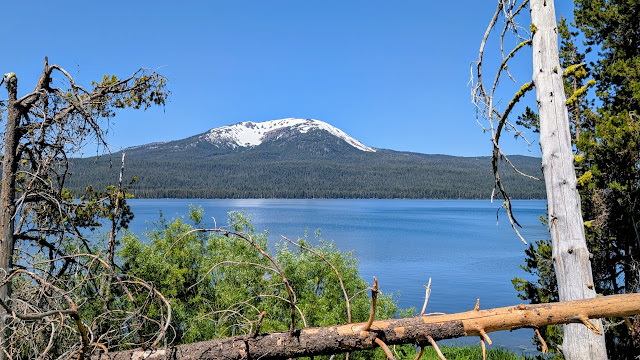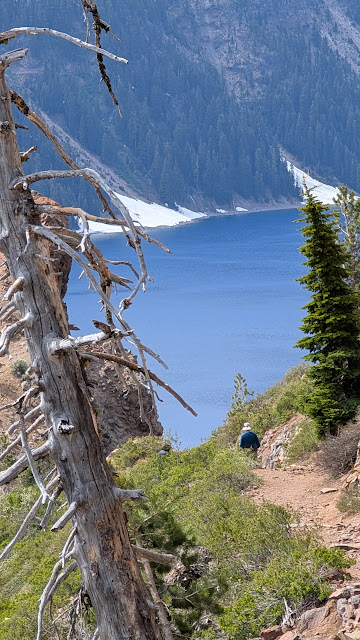Beautiful Lakes of Southern Oregon
 |
Leaving Bend behind (at least for a few weeks) we headed to our next camping spot, just ½ hour away in
La Pine, Oregon. We purposely wanted to be fairly close to civilization in case we missed something
during our shakedown week. As it turned out, we needed to head back to Bend once to get a few essentials
and to stock up on food for our week in Diamond Lake. Our campsite in La Pine was nothing to write home
about--its best feature was the view of the meadow out the back. But the La Pine area presented a couple of
good exploration opportunities!
| Our back window view |
First we set out on our bikes to explore LaPine State Park. The park is perched on the Deschutes River and has many miles of little-used trails. We particularly like one trail that followed the river for quite a ways and ended up in the state park campground, which was pretty nice. There were many overlooks with spectacular views of the river and surrounding forest.
 |
| Paulina Lake |
 |
| Paulina Peak |
 |
| The obsidian lava flow seen from above |
of the most beautiful spots in all of North America. Nearly perfectly round, surrounded by snow capped mountains
and colored the deepest blue imaginable, Crater Lake takes the breath away. Formed only 7,700 years ago (a milli-
second in geologic time), the lake is what is left of Mount Mazama, which erupted and collapsed spectacularly into
a magma chamber, leaving a hole thousands of feet deep. The area receives one of the highest snowfall totals in the
country, averaging 45 FEET per year; so over centuries, the hole was filled with water. No streams flow into it or
out of it to cloud the water, so it is spectacularly clear. The pure water absorbs all the colors in sunlight except the
purest blue, which is reflected back to our eyes. We hiked part way up Mt. Garfield (stopped by a treacherous
ice field across the trail) and visited many overlooks along the rim. We also checked out a historic lodge built in
1910 that is still a resort hotel today.
 |
| Crater Lake |
 |
 |
| Thousand-year-old bristle cone pine tree |
 Crater Lake Lodge |
There is no place for us to camp in Crater Lake National Park, so we spent the week at nearby Diamond Lake. While
it is no match for it’s more famous sibling, Diamond Lake had charms and attractions of its own. It is flanked by a
few beautiful mountains and has a wonderful paved bike trail around the whole lake. We took advantage of that trail
a few times and really enjoyed the views and the thrill of winding through the forest with the freedom of bicycles.
Our campground was practically empty for much of our stay and was a peaceful oasis in the woods (which we unfor-
tunately shared with a significant population of mosquitoes).
 |
| Mt. Bailey from the Diamond Lake bike trail |
 |
| Mt. Thielsen from Diamond Lake |
 |
| Pretty meadows are home to thirsty mosquitoes! |
 |
| Tiny waterfall along the bike trail |
Being in an extremely isolated area during the new moon presented the opportunity for me to explore my Pixel
phone’s night photography powers. While not as powerful or versatile as my former “real” cameras, it still did a
passable job of capturing the night sky wonders!
 |
| Milky Way long exposure with Pixel 9 Pro XL |
This is a shot from 2016 when I was a more serious photographer. I was taking a night photography workshop at
Crater Lake.














Wow, it looked like the universe was putting on a private show for you both! The universe showed up in full splendor.
ReplyDeleteWow! Thanks so much :)
ReplyDeleteAll of the falls are just amazing; such beauty in our universe. So happy you’re still smiling Lynnae, even with a broken wrist. What troopers! 🥰
ReplyDeleteThanks for sharing. Wonderful photos. Really appreciate it. Inspiring!
ReplyDelete